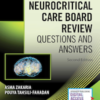It Is a Marathon, Not a Sprint – Sustainability of Stewardship in ICUs
journals.lww.comICUs are arguably the most important yet most challenging hospital environments for antimicrobial stewardship. The stakes are high with critically ill patients, where the burden of resistant Gram-negative pathogens is greater and associated with poor clinical outcomes.
It is estimated that 70% of patients receive antibiotics during an ICU stay; however, half of these antibiotics are continued for over 72 hours in the absence of a diagnosis of an infection and 30–50% of these antibiotics are considered inappropriate based on a lack of infection, excessively broad spectrum of activity, or prolonged duration of use.
This is not surprising, since there is significant overlap between the presentation of noninfectious and infectious clinical syndromes.
Additionally, it is challenging to fight clinical inertia and stop antibiotics in the absence of an infectious diagnosis or determine duration of therapy when an infectious diagnosis remains unclear especially in the face of clinical improvement.

















